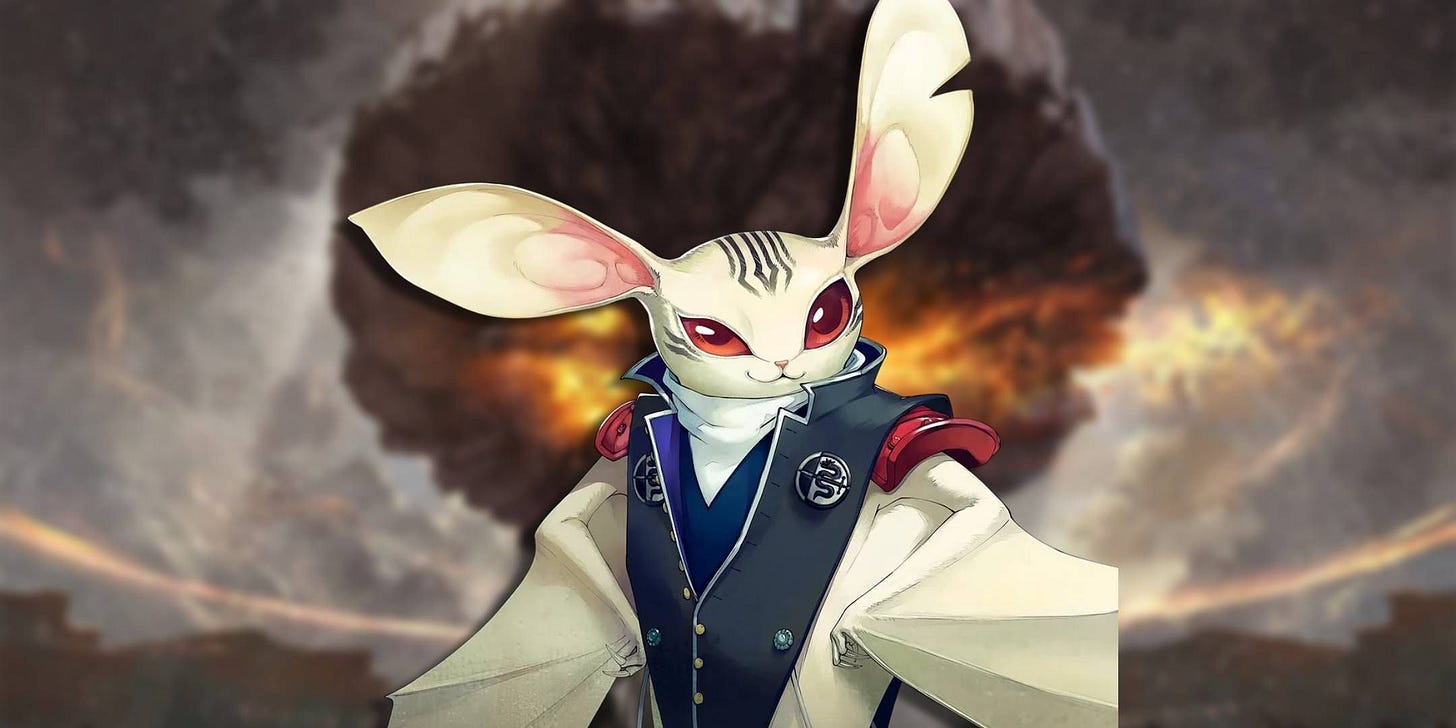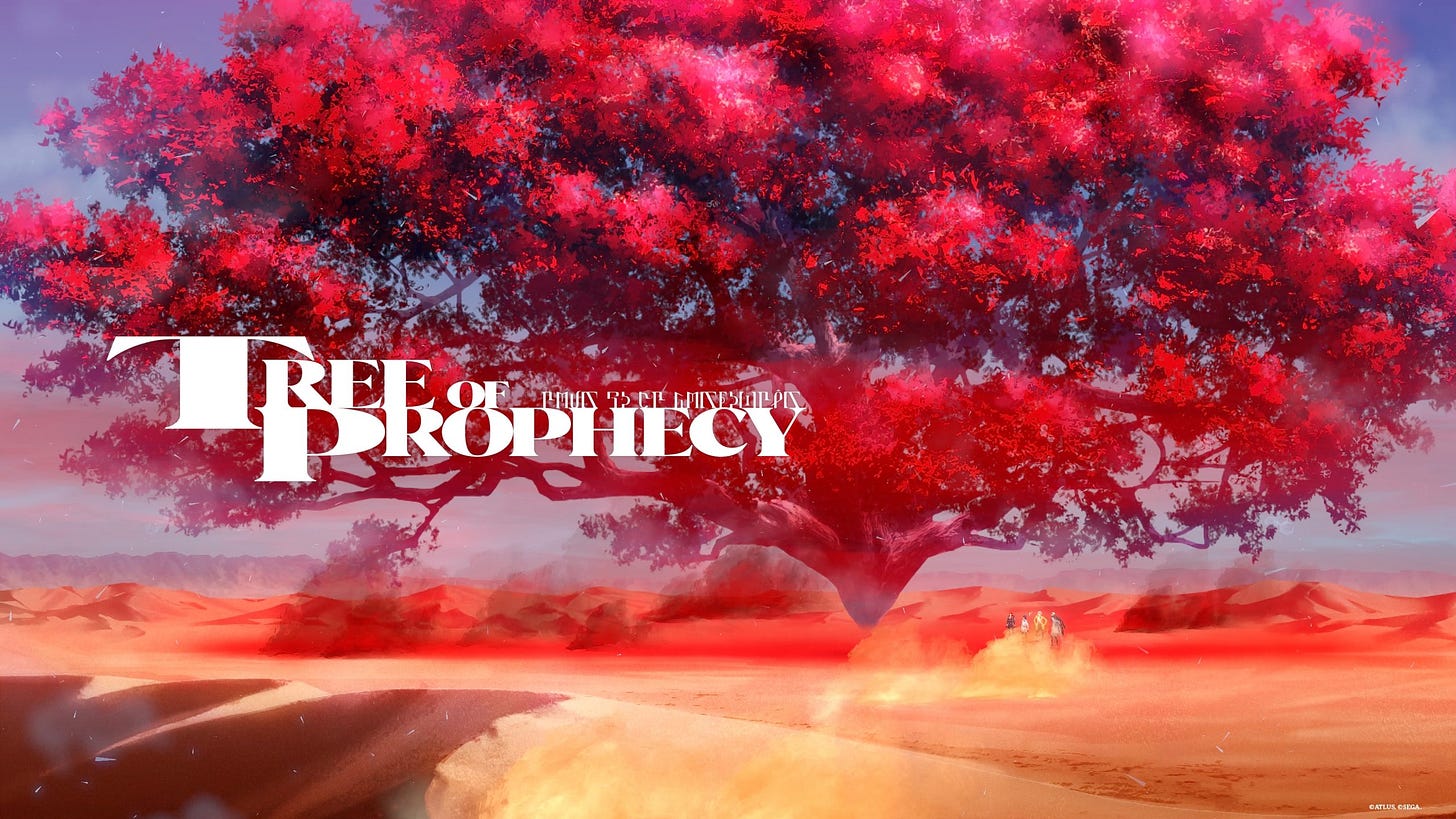Metaphor: ReFantazio is one of the greatest video games ever made
How my 2024 Game of the Year balanced depth with polish, incredible characters, and lessons for others to learn
The first trailer of Metaphor: Refantazio intrigued the heck out of me. Persona meets Game of Thrones? OK, then. I wasn’t 100% on board to buy immediately, especially having been burnt by the similar-feeling Tokyo Mirage Sessions FE, but my interest was piqued.1
Then, I learned that there would be a free demo dropping a couple of weeks before the game was formally released. I downloaded it immediately and jumped in, ready to test my mettle and see if this game was worth buying.
Since that demo, I kind of knew in my heart that Metaphor: Refantazio would be my Game of the Year. The more I played, that initial inclination became stamped down as fact. Once I completed Metaphor, after 100 hours of playtime, I stumbled upon an even greater revelation: this is not only the best game released in 2024, but the best game Atlus has ever published, and one of the greatest of all time.
+++++++++++++++++++++++++++++++++++++++++++++++=
Before going too deep into why Metaphor’s story and characters are fantastic, especially since that delves into spoiler territory, a game is only as fun as its mechanics allow - and thankfully, Metaphor has familiar yet iterative mechanics that make battles a joy. The turn-based system carries its weight, even with the removal of Persona 5’s Baton Pass. It feels fluid, intuitive, and allows for experimentation between different Archetypes, this game’s “job” system. I do think there are “correct” choices for each character’s build - there are special archetypes for each character that make the end game a bit easier to navigate - but I did manage to experiment a fair bit and had fun doing so. Turning the elven knight Hulkenberg into a master markswoman, for instance, had great synergies with her ability to draw attacks onto her, as she could do so from the less vulnerable backline and still generate good damage on opponents.
The Archetypes are also fairly easy to level up in the late game once certain characters are maxed out. Grinding in dungeons is reminiscent of P5’s Mementos, where if your party is overleveled they can immediately kill their opponent instead of entering into an actual turn-based battle. I spent a couple of in-game days doing this for a couple of hours on-end, which served me well in optimizing my end game.
Boss battles are generally creatures based off of Hieronymous Bosch paintings and they are creepy, intricate, and unique. I don’t think any of the bosses had quite the over-the-top artistry as Persona 4 or 5 bosses, but they’re compelling enough to make for interesting fights.
This game is incredibly deep, but also immaculately polished. You never have a wasted day in terms of upgrading a relationship with a partner - if you have the indicator to hang out with them, you WILL see an upgrade, guaranteed. Also, relationship upgrades only require eight meetings instead of ten, which feels correct - encounters feel edited and important instead of similar games (cough - Dragon Age: The Veilguard - cough) where those interactions with NPCs can feel a bit unnecessary and stilted. The presentations helps internalize the fact that this is a journey. There are moments in your travels where the game will just stop to show you an incredible vista, no questions asked. They just wanted to flex their artistic abilities, and that’s cool with me.
The game plays well and looks amazing, but I’m a stodgy purist at heart - I need a good story and characters for something to be my Game of the Year. A lot of JRPGs fail in this regard - thankfully, this is where Metaphor thrives the most. Spoilers ahead.
+++++++++++++++++++++++++++++++++++++++++++++++
At its core, Metaphor is a story about coalition building. You play as an Elda, one of nine races in the United Kingdom of Euchronia. You are tasked with your fairy companion, Gallica, to find an informant hidden within an imperial fortress. Dumped on the doorstep of the army’s recruitment station, you meet Strohl, the straightforward horned Clemar who instantly becomes your best friend. From there, you’re quickly thrown into a sprawling plot of murder, palace intrigue, societal turmoil and, most importantly, a literal and metaphorical race across the continent to earn enough votes to be the next King of this land.
As someone used to the more sophomoric plots of the Persona series, Metaphor feels like headier ground for this group to tread. Studio Zero, the developers of Metaphor, mainly consists of ex-Persona developers who needed something different and wanted to pursue more mature paths in their storytelling and gameplay. Metaphor feels like something substantive that aims to inspire, and this story is a mature one. There are still silly moments like having to escape through the business end of a sandworm or banging pots and pans to force the echolocating Heismay out of hiding, but they never feel unwelcome or, most importantly, unfunny. For a JRPG, Metaphor’s restraint and comedic timing is pretty impeccable. These moments feel like mirthful breaks on a journey instead of cringy, overworked attempts at hamfisted humor.
You are thrust into the middle of an election, and the antagonist, Louis Guaibern, is an autocratic fascist who wishes to bring all citizens of Euchronia to heel. He is charismatic and beautiful, a deadly combination. The people feel safe and protected by him - and it’s on you and your retinue to persuade the citizens otherwise. Thankfully, you’ve got incredible friends.
It’s rare that there is not a single member of a party I dislike2: everyone in Metaphor is great and carries their weight. Strohl and Hulkenberg are your loyal stalwarts, and both have great moments as part of your party. Songstress Junah has more to her than meets the eye - she’s probably the party member I was least drawn toward and I still enjoyed her immensely. Priestess Eupha’s relationship arc is genuinely one of my favorite in the game. The nerdy Neuras makes for a wonderful ship’s pilot - although I find his relationship arc to be middling in comparison to others - and even Gallica is less annoying than helpful. Other bonds with side characters are generally interesting - favorites of mine were faker Alonzo, merchant Brigitte, and commander Bardon.3 The most underused character in the game is Eupha’s level-headed brother, Edeni, who can control the weather and deserves his own DLC. I will die on this hill. Edeni warriors, rise up.
Basilio and Heismay, though, are a cut above. They may be some of the best characters I’ve ever played with in a JRPG. Basilio and his brother, Fidelio, evoke Liverpudlian mod-fashion charm as the dog-eared Paripus. Their arcs are around who deserves protection and how to reconcile one’s earned status with the morality of helping others, and it DELIVERS. When the Fidelio twist first happened, and he died, I was a little sad that he was the brother we lost. By the end of the game, I couldn’t imagine it the other way around. Basilio is so endearing, loyal, and willing to take risks and grow throughout the story. Yet, somehow, he’s not my favorite party member (or my favorite video game character in 2024.)
That honor goes to Heismay4, the Eugief who we are sicced on in Martira for, allegedly, kidnapping children and killing them. The truth is darker than that, made even moreso as we learn more about this dashing thief who doubles as this series’ mascot character. Historically, mascot characters in Atlus games are awful. I hated Morgana. I hated Teddy. I adore Heismay. His personal journey - coming to grips with the death of his son, and the reclamation and spreading of his ashes - is heartbreaking and uplifting all in one. He also has some of the best lines of the game: one that’s stuck with me is when he bellows at an antagonist who is mourning their lost child, “Grief is it's own death, so we will show you life!” Philippe Spall, in my opinion, should have been nominated for a Game Award for his portrayal of Heismay - while all of the voice actors in this game thrived, he provided a gravitas that made this character utterly unforgettable.
The best part about these characters is that, to win the game, you HAVE to use all of them. I found that unlike other JRPGs, Metaphor is difficult enough where rotating party members is mandatory to keep SP levels decent and win critical boss fights. During the endgame, I was forced to constantly rotate my team in and out in order to maximize my odds of winning. Hulkenberg, who had been benched for a bit, suddenly became essential. I was rewarded for my previous grinding as between her Magic deflection and Heismay’s Royal Thief dodging abilities, the final boss only had sustained turns 25% of the time. I rotated Basilio, Junah, Strohl, and Eupha through the third slot, attacking along with my protagonist. It was a thrilling, gripping battle that really ensured no party member was left behind (and was a battle I won, somehow, on my first attempt.) Only your strange coalition could stop the evil and save the world.
Meanwhile, beyond the battles, you are talking to the people of Euchronia and hearing their issues. You are taking them seriously, listening to them and trying to do right by them. This is because, on your journey, you’ve learned about the perspectives of every race and class in this world. You understand where they’re coming from, and what’s most important for a leader - taking the reins and setting an example for the rest of your people to follow. This is Populism: The Game.
In a world where language and themes in gaming are often unfairly criticized, Metaphor may be the most progressive and “political” title I played all year in terms of its intent and theory. It’s in the game’s DNA - and it sold well and was generally unscathed by bad faith critiques because, at heart, people want to do good and be good to others. I believe we live in a world where isn’t enough to signal and gesture at identity politics anymore. It’s time for us, and a game’s characters, to just confidently DO the right things in-game. Metaphor challenged its audience in that regard and faced minimal blowback. Perhaps, from this, other game writers and developers can learn a lesson.5
+++++++++++++++++++++++++++++++++++++++++++++++
Metaphor: ReFantazio is an incredible achievement in game design, art, and writing. I hope that its critical and commercial success lead to success for Studio Zero. I’m glad to give it my Game of the Year, and cannot wait until 2025 - when its lessons of carmaraderie, listening to each other, and trying to push through and make the world a better place will be more important than ever.
I have faith, though.
As Heismay once said: “If you cast aside belief, all that is left is to die a slow death." In 2025, let’s believe in being better, and work together to reach that improved destination.
Also, I wasn’t aware that the game was out on devices outside of XBOX! Once I learned differently, it elevated in my estimation.
In fact, the only main party member’s design who I dislike is the main character’s! He looks weird, I’m sorry, I don’t like bowl cuts and heterochromia, sue me. But I love him as a person.
I actually think Bardon’s bond would have been more interesting if he wasn’t re-elected at the end. I love the story of someone who is great at defending their city, maybe bad at politics, loses, but then figures out that he can help his community in an unelected capacity. I think that would have been an interesting avenue to explore.
Brigitte’s story is perfection. She’s so loveable by the end of it.
The only bond that didn’t work for me was Catherina’s, to be honest. It feels redundant with Basilio, who’s story is told better.
Top 10 characters this year: Heismay, Basilio, Andreas (Pentiment), Red XII (FF7: Rebirth), Protagonist, Eupha, Barret (FF7: Rebirth), Otto (Pentiment), Brigitte, Guy (Pentiment). HM to Louis/Strohl/Hulkenberg/Fidelio/Junah, Pip/Thrash (The Plucky Squire), Tifa/Cloud/Aerith (FF7R), Lucanis (DA: The Veilguard), Paul/Magdalene/Father Thomas/Agnes (Pentiment).
I also recognize that Japanese developers are given way more leeway from the annoying folks on the internet than American developers are. It’s a tough needle to thread, but I think we can learn something here. There’s a way to get the point across, and Metaphor strikes me as a great exemplar.







